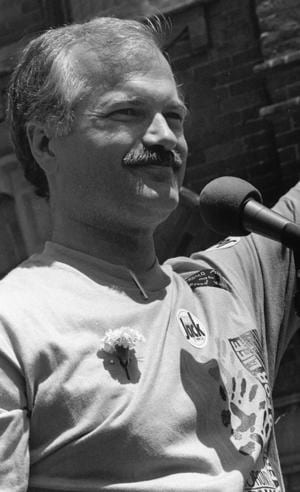If you came of age in the gay community in Toronto in the ’80s and ’90s, Jack Layton seemed to be everywhere. If some arts organization or charity held a fund-raising auction and needed an auctioneer, they’d inevitably turn to Jack, master of the rat-a-tat-tat delivery and the nonstop quipping that keeps such events festive and the money flowing. If you belonged to almost any gay organization in the city, chances are you would find yourself turning to Jack at some point for advice or help or encouragement. He’d be there. If you were a gay bathhouse owner, struggling with a city hall intent on refusing permits to any new establishment, Jack would be in your court (winning, finally, an end to the city’s moralizing bureaucratic manoeuvres). If you were affected by HIV and AIDS (and who wasn’t?), you saw Jack, in his capacity as chair of the Board of Health, pushing for condom distribution in the baths, pushing for safe-sex education and, perhaps most importantly, helping Hassle Free Clinic to win the right to test for the virus without revealing the patient’s identity to the Ministry of Health (anonymous testing was illegal until 1991). And Pride? Other politicians had to be cajoled into being part of our community celebration. Not Jack. First elected to Toronto City Council in 1982, he leapt at the chance, his love of a good party almost as fervent as his passion for social justice (in 1996, the Pride Day Committee recognized his pioneering commitment by celebrating him as a community hero).
His maiden speech to Parliament after he was elected in 2004 called for equal marriage, and when the issue came before the House a year later, he was the only leader to whip the vote in favour (he also bumped from caucus the sole NDP-er to vote against it). That support went way back — when he married Olivia Chow in 1988, he expressed the hope that one day he might be able to attend the weddings of his gay and lesbian friends.
Back in January 2001, I profiled Jack and Olivia for Toronto Life. Met them at their home on Huron St, a place that still felt like student digs, a place that drew supporters and friends into its warm embrace and echoed often with laughter and debate and disagreement and compromise (when necessary), and with conviction (always). I watched Olivia make chicken feet soup. I heard Jack switch into Cantonese when he introduced me to his mother-in-law, Ho Sze Chow. I heard Olivia tease him about getting rid of his mustache, managed to hear, through his boisterous laughter, her soft throwaway line: “It’s better for kissing.” It was probably as informal an interview as I have ever done, and certainly the most fun (they were very teasable — they laughed when I called them recalcitrant hippies for still having a water bed).
At that point, many of his significant achievements were still in the future, but he understood that progress could come from what he half-jokingly called “Lilliputianism” — small actions, small victories, all of them building until the world was suddenly a different, and a better, place. As I was leaving that night, he pointed out that their home had once been a vintage clothing store called Courage, My Love. I reflected at the time how fitting that was, given their idealistic, sometimes unfashionable, politics, and given the way they bolstered and balanced and somehow blessed each other, and given how, without courage, or without love, politics is just a business.
Courage, My Love. That was always the beating heart of Jack’s message, and of his life. If we listen, if we act, we can make it his legacy.

 Why you can trust Xtra
Why you can trust Xtra


